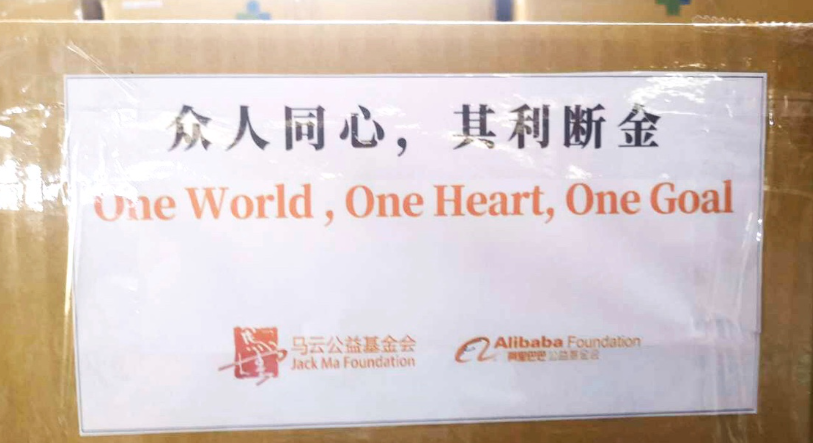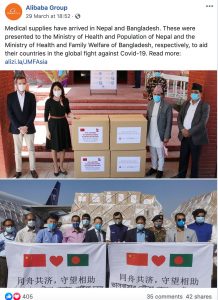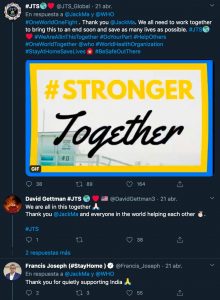Following up from our previous post, “Leading Corporate Responses During COVID-19 Outbreak“, we will look more deeply at Alibaba’s global program to provide a deeper analysis of their program, donations to date, and provide a few takeaways for readers.
As a global leader in e-commerce, and one of China’s most prominent brands, the Alibaba Group announced that it would support other countries in the fight against the coronavirus pandemic by delivering medical supplies (including testing kits, ventilators, and PPE) to countries across Asia, Africa, Europe, North America, and South America.

These supplies have been gradually distributed across the globe, first to affected cities in China, and to countries that were particularly vulnerable to the pandemic.
Since the announcement of its overseas program as in March 2020, through its two foundations, Alibaba Foundation and Jack MA Foundation, numerous shipments have been already been sent:
- March 13: Alibaba Foundation sends 500,000 testing kits and 1 million masks to the United States, and an additional 3 million face masks, 2,000 medical ventilators, and 170,000 pieces of protective gear to New York. Governor Cuomo publicly thanks Alibaba Foundation for its support
- March 16: Alibaba Foundation donated 1.8 million masks, 100,000 testing kit, 800 ventilators, 300,000 protective gowns sets and 300,000 face shields to hospitals in Europe, including Italy, Spain, Germany, France, the Netherlands, Belgium, UK, Denmark, Sweden and Switzerland, Norway, Ireland, and Portugal.
- March 16, the Jack Ma Foundation and Alibaba Foundation announced to donating medical supply and additional equipment to each of the 54 countries. The donation consisted in 3 batch donations: First one on March 16, second one on April 6 and the third one on April 20. Totaling 4.8 million masks, 1 million gloves, 540 test kits, 401,000 sets of protective clothing, 401,000 suits and face shields, 800 ventilators, 4,000 thermometers and body temperature scanners, and 1.5 Million swabs.
- March 19: Jack Ma Foundation and Alibaba Foundation donate essential medical supplies to 23 Asian countries, including Japan, South Korea, India, Azerbaijan, Bhutan, India, Kazakhstan, Kyrgyzstan, Uzbekistan, and Vietnam. Totaling 7.4 million masks, 485,000 test kits, 100,000 sets of protective clothing.
- March 22: Alibaba Foundation commits to donating 2 million masks, 400k test kits, and 104 ventilators to 24 Latin American countries, including Argentina, Brazil, Chile, Cuba, Ecuador, Dominican Republic, and Peru.
- March 26: Russia thanks Jack Ma for donation of more than a million face masks and 200,000 coronavirus testing kits
- March 29: Alibaba Foundation sends medical supply donations to the Middle East, Israel in Tel Aviv and Jordan on April 4, including 100,000 detection kits, 30 ventilators, 300,000 face masks, 50 infrared thermometer guns, and 10,000 sets of protective clothing for medical professionals.
- March 31: The Alibaba Foundation donates 500,000 masks and 100,000 tests kits to Canada to help fight COVID-19 in the country.
- April 21, the two Foundations announced a donation to the World Health Organization of 100 million face masks, 1 million N95 Masks and 1 million tests kits to be distributed globally to the countries deemed to be in urgent need.
Following each announcement, Alibaba has used its social media platforms to engage stakeholders, foreign and domestic. To date, the response has been mixed, with some viewing these efforts to be part, or aligned to, the Chinese government’s own propaganda campaign.


Conclusion:
When reviewing the Alibaba efforts, the size, scale, and scope of their programs is without question one of the world’s largest and widest, and the impact of those programs will bring tangible benefit to the communities and healthcare workers they have engaged with.
Their quick action, and ability to activate their platform, was in line with our belief the the best CSR programs are ones that are aligned by company mission, processes, and the people. It is a program that lead to a significant amount of positive coverage for the brand, was focused primarily on the impact of the programs, and even when faced with negative press, continued forward.
All of which leads us to view Alibaba’s program as a best case, and one in which many firms should look to when developing their own programs.
